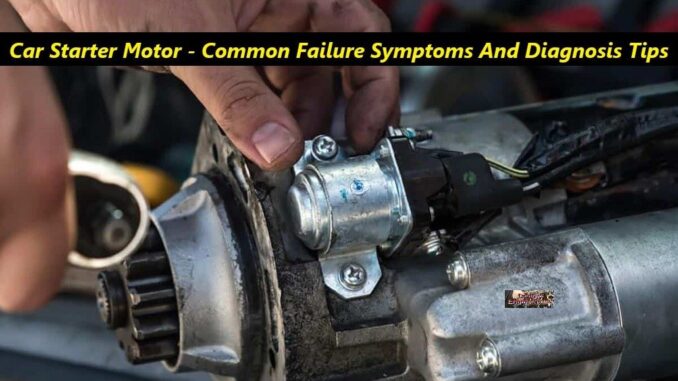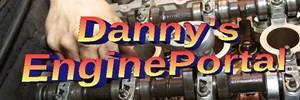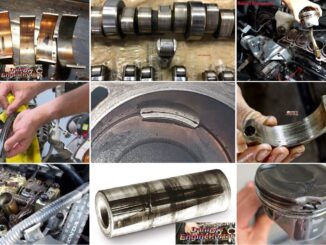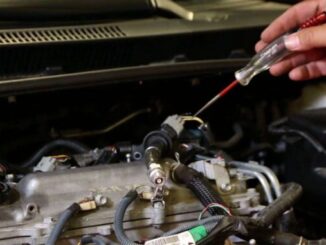
KNOWING THE SYMPTOMS OF A FAILING CAR STARTER MOTOR, CAN HELP YOU DIAGNOSE MANY PROBLEMS.
When diagnosing car starter problems, always start with the car battery.
So, for your starter to work properly, your car battery has to be in excellent working condition, and fully charged.
The car starter motor, is used to rotate the engine, to begin the starting process. But, for the engine to start, many things need to happen, simultaneously and in rapid succession.
For the engine to fire, one of the most important factors, is turning of the flywheel. When the ignition key is turned, a low amperage electrical signal, is sent to the anti-theft system and computer.
The signal then continues to the starters solenoid, which activates the high amperage side of the electrical system.
As a result, engaging the starting motor. The objective of the car starter motor, is to rotate the engine, between 85 and 150 rpm’s.
BASICALLY, THERE ARE TWO MAIN PARTS IN EVERY CAR STARTER MOTOR:
- The primary motor, that turns your crankshaft and starts your engine.
- The solenoid, that simultaneously engages the drive gear, and closes the main motor’s electrical contacts.
Poor maintenance or just wear and tear can cause, starting system troubles. Even with decent maintenance, the different system components get a lot of wear, during their service life.
With more and more vehicles being fitted with stop/start technology, the strain on car starter motors has been, greatly increased.
Over a period of time, the starter motor will eventually run its course and wear out. The two components inside the car starter motor, that commonly fail, are the solenoid or the starting motor itself. So, if this happens, the starting motor will have to be replaced.
COMMON SYMPTOMS YOU MAY NOTICE, WHEN TRYING TO START YOUR ENGINE:
Engine Will Not Turn Over
The most common problem with a starter motor is, when you turn your key and nothing happens. A solenoid or motor that has burned out or electrical issues, may cause this as well. Furthermore, a dead car battery, can cause the same problem. It may appear that you have power to your starting system, but the engine will not turn over.
Consequently, starters do take a lot of power to work properly. So, 9 out of 10 engines, with starting problems during winter months are, car battery related.
Starting Motor Engages, But Doesn’t Spin The Engine
So, there are times when you’ll turn the key, and hear the car starter motor activate. But, it will not crank over. Because, issues with starter motors can be, mechanical in nature. The gears that connect to the flywheel and make it turn, may be the problem. As a result, either the gear has stripped or has become, dislodged against the flywheel.
Grinding Noise, When Trying To Start The Engine
A worn starter drive gear not making proper contact with the flywheel, could make this noise. This is similar to the one that is heard, if you start your engine, and then accidentally restart it.
However, grinding may also happen, inside the starting motor. In either case, it’s something that can’t be fixed, on the engine. As a result, damage to your flywheel will happen, if not repaired quickly.
You Smell Or See Smoke, When Starting The Engine
Electricity powers all starters. Sometimes, the starter motor will overheat. If this occurs, you’ll most likely see or smell smoke coming from, underneath the engine. And, a short circuit or failing ignition switch, may cause this.
Starter, Soaked With Oil
The starter is often located, around the bottom of the engine. And, is vulnerable to soaking from leaks. An oil-soaked starter likely has, a short life remaining. So, consider fixing the leak and replacing the car starter motor, before it fails completely.
Malfunctioning, Starter Solenoid
The solenoid transmits electrical current, from the car battery, to the starter motor. When you turn the key, it pushes the starter drive into the flywheel, to allow cranking. And, without the solenoid, the starter will not work.
If you turn the key and nothing happens, try jiggling the transmission gear shift lever. If the engine still will not crank, there might be something wrong with, the solenoid.
Engine, Freewheeling
Freewheeling occurs when, you try to start the engine and simply hear a whining noise. And, the engine does not turn over. When this occurs, it means the car starter motor is not engaging, with the flywheel. This is a worrying situation, which could result in having to replace the whole component.
Intermittent Issues, Starting The Engine
If you try to start your engine and the engine doesn’t start instantly, you may have to try again. If it works the second time it is most likely, due to a problem with the relay.
The relay is an all or nothing device, meaning that it either, sends the full electrical current or nothing. In some occasions, a damaged relay, can cause a clicking sound, when you turn the key.
Automotive Car Starter Stays Running, After The Engine Started
When you start the engine and release the key, the circuit will stop the power to the starter motor. If this stays on after the engine has started, the main contacts in the solenoid, have most likely failed. This will ultimately cause serious damage, to the whole starting system, and the flywheel.
CONCLUSION
So, problems with the car starter motor, are virtually impossible to avoid. And, there really isn’t any suggested replacement, by the manufacturer.
BY DANNY BENDER




